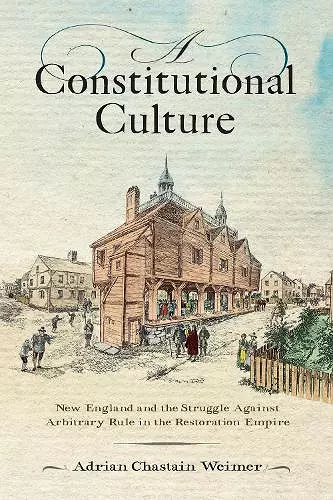A Constitutional Culture
New England and the Struggle Against Arbitrary Rule in the Restoration Empire
Format:Hardback
Publisher:University of Pennsylvania Press
Published:12th Apr '23
Should be back in stock very soon

Adrian Chastain Weimer's A Constitutional Culture explores how early colonists resisted arbitrary rule and established a strong foundation for self-governance amid royal pressures.
In A Constitutional Culture, Adrian Chastain Weimer reveals the compelling narrative of how colonists, long before the American Revolution, dedicated themselves to protecting local political institutions from arbitrary governance. Following the restoration of Charles II to the English throne in 1660, the Puritan-led colonies faced significant challenges as the king imposed demands that threatened their autonomy. He sought to alter voting practices, baptismal policies, and local laws while eyeing valuable resources, such as forests, for the English navy’s needs. To enforce his will, Charles dispatched royal commissioners, ostensibly heading for New Netherland but easily redirected to Boston, forcing colonists to confront a critical decision regarding their governance.
The response from the colonists was not limited to freemen; it included those often marginalized, such as non-freemen, indentured servants, and women. Together, they developed a vibrant constitutional culture that resisted the crown’s authority. This culture was marked by skepticism towards metropolitan ambitions, a commitment to civil and religious liberties, and a belief in self-government as a divine right. Weimer illustrates how these communities articulated their constitutional ideals through practices like fast days, public debates, committee work, and petitions, showcasing their readiness to challenge arbitrary rule.
Ultimately, A Constitutional Culture highlights how New Englanders forged a resilient framework for self-governance, equipped with a critical vocabulary for dissent and a collective understanding of divided sovereignty. This constitutional culture proved to be a formidable barrier against an imperial authority determined to centralize power, laying the groundwork for future democratic principles in America.
"Exactly where, or in the words of whom, a widespread belief in colonial sovereignty first articulated itself is really not the question this book sets out to answer—its author is far too astute and sensitive a reader of the archive to fall into that trap. Instead, we have a messier portrait of this time and place, one that is richer because its author wisely chooses to let these competing, contradictory, confusing, and (quite?) arbitrary set of political, cultural, and religious arguments exist without forcing them into resolution...Thanks to Weimer's study, we have a much more detailed, better-argued, and persuasively evidenced account of one of the lesser-studied chapters of the longer narrative of how the United States came to believe in the legitimacy of its own self-rule." (Early American Literature) "The 1660s in New England were once considered diminished and insignificant, a once united and inspired society that had lost its original direction….In Adrian Chastain Weimer's hands, the 1660s emerge as the opposite of diminished and insignificant….[Her] analysis of this decade and her argument about constitutional thinking in the early English Atlantic are convincing….She rehabilitates Restoration New England as a vibrant and politically engaged place where dynamic debates took place about the future among an energized population" (William and Mary Quarterly) "
A Constitutional Culture tells a captivating story of division, resistance, and the charter-based allegiance of New England's colonists to the newly restored Stuart Crown in the 1660s...Weimer constructs a clear, resolute perspective of colonial resistance through the Restoration era that is both compelling and comprehensive. Her
familiarity with the sources and historiography is evident in the well-crafted, detail-rich story of this very impressive work.
ISBN: 9781512823974
Dimensions: unknown
Weight: unknown
277 pages